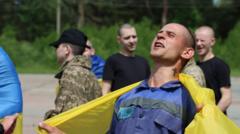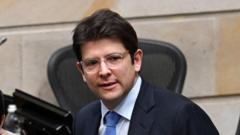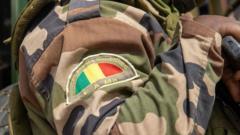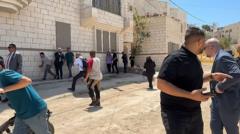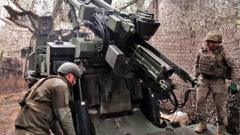The recent surge in violence against the Colombian military and police underscores the challenges facing President Gustavo Petro's peace initiatives.
**Surge in Violence: 27 Colombian Security Forces Killed Amid Gang Retaliation**
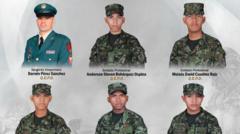
**Surge in Violence: 27 Colombian Security Forces Killed Amid Gang Retaliation**
Amid rising tensions, Colombian security forces face targeted attacks resulting in 27 fatalities as armed groups retaliate.
In a devastating escalation of violence, the Colombian government reported that 15 police officers and 12 soldiers have been killed in targeted attacks attributed to armed groups over the past two weeks. President Gustavo Petro has pointed to the Gulf Clan criminal gang and other factions as responsible for these assaults, which are believed to be acts of revenge following the deaths of several group leaders.
In response to the rising death toll, the government has announced a reward for information that could lead to the apprehension of those responsible for the attacks. The situation has escalated since April 15, with Petro publicly sharing the names of the fallen security personnel on social media platform X. Notably, a significant ambush in Guaviare province led to the deaths of seven soldiers, for which the military has blamed a dissident faction of the once-dominant Revolutionary Armed Forces of Colombia (FARC).
The FARC, which initially signed a peace agreement with the Colombian government in 2016, has seen some of its members break away and continue armed resistance. As part of efforts to restore peace, Petro's administration engaged in dialogue with several dissident groups and the National Liberation Army (ELN), alongside the Gulf Clan. However, these talks have faltered, particularly after Petro suspended negotiations with the ELN in January, citing their lack of commitment to peace.
The Colombian government has been under pressure, not just from internal factions but also from the need to uphold peace agreements while responding firmly to criminal activity. Reports indicate that the Gulf Clan has ordered its members to target police and military personnel both on and off duty, escalated by recent operations against their leadership that have resulted in high-profile arrests and killings.
This cycle of violence poses serious challenges not only to public safety but also to the broader ambition of achieving total peace in Colombia, as tensions between the government and armed groups continue to flare.
The nation is now faced with pressing questions about the future of its peace efforts and the continued impact of organized crime on public security.
In response to the rising death toll, the government has announced a reward for information that could lead to the apprehension of those responsible for the attacks. The situation has escalated since April 15, with Petro publicly sharing the names of the fallen security personnel on social media platform X. Notably, a significant ambush in Guaviare province led to the deaths of seven soldiers, for which the military has blamed a dissident faction of the once-dominant Revolutionary Armed Forces of Colombia (FARC).
The FARC, which initially signed a peace agreement with the Colombian government in 2016, has seen some of its members break away and continue armed resistance. As part of efforts to restore peace, Petro's administration engaged in dialogue with several dissident groups and the National Liberation Army (ELN), alongside the Gulf Clan. However, these talks have faltered, particularly after Petro suspended negotiations with the ELN in January, citing their lack of commitment to peace.
The Colombian government has been under pressure, not just from internal factions but also from the need to uphold peace agreements while responding firmly to criminal activity. Reports indicate that the Gulf Clan has ordered its members to target police and military personnel both on and off duty, escalated by recent operations against their leadership that have resulted in high-profile arrests and killings.
This cycle of violence poses serious challenges not only to public safety but also to the broader ambition of achieving total peace in Colombia, as tensions between the government and armed groups continue to flare.
The nation is now faced with pressing questions about the future of its peace efforts and the continued impact of organized crime on public security.





